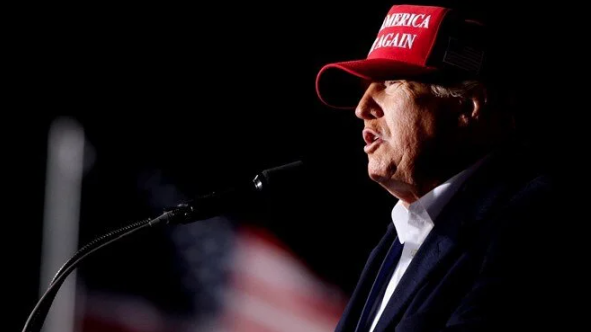The Colorado Supreme Court’s decision last week that former President Donald Trump is unable to pursue federal office under the requirements of the 14th Amendment is a practically unusual occurrence.
Nearly.
Former elected officials who engaged in “insurrection or rebellion against” the federal government are barred from taking office by Section 3 of that constitutional amendment, established in the aftermath of the Civil War. It is plainly a clause intended to prevent former Confederates from returning to Congress after the war, but the Colorado Supreme Court has concluded that Trump’s conduct in sparking the January 6, 2021, riot at the United States Capitol fulfills the amendment’s ambiguous qualifications. Maine Secretary of State Shanna Bellows declared on Thursday that Trump’s name will be removed from the state’s primary ballot because he is ineligible for office under the requirements of the 14th Amendment.
read more:
- South Africa becomes the first country to take de facto action by filing a “genocide lawsuit” against Israel
- It seems that there is no next day for Gaza
Trump is only the second individual to be deemed ineligible for federal office because of that law since Reconstruction ended.
The first is Victor Berger, who is arguably better remembered as the first Socialist elected to Congress.
Berger was born in Austria and moved to America as a young man. He was elected to Congress in 1910 to represent Milwaukee, Wisconsin, and served a single two-year term. Berger remained engaged in left-wing politics after his defeat in 1912, and he opposed America’s participation into World War I. He was convicted (along with many other Socialist organizers) of violating the 1917 Espionage Act, which essentially criminalized any criticism of the war effort, in 1918.
Berger was officially found guilty of 26 “disloyal acts” in connection with a series of editorials published by the Milwaukee Leader, a paper Berger helped run, opposing America’s engagement in the war.
Despite, or possibly because of, his conviction, Berger was re-elected to Congress in 1918. His campaign urged the country to preserve free speech and press freedom, and he continued to advocate for “early, general, lasting, and democratic peace.” (Of course, he also pushed for a number of traditionally horrible Socialist ideals, such as industry nationalization.)
This is where Section 3 of the 14th Amendment comes into play. When Berger arrived at work in January 1919, Congress refused to seat him on the grounds that his Espionage Act conviction amounted to mutiny against the government. The result was 311-1, with a Wisconsin Republican casting the lone opposing vote.
In December 1919, a special election was called to fill the still-vacant seat, and Berger won again, this time with more votes than the previous year. A majority of Congress once again decided to prevent Berger from taking his position.
There was one more twist in store, as well as a final piece of trivia: Kenesaw Mountain Landis was the US district judge who presided over Berger’s Espionage Act trial.
Landis’ role in another (perhaps more famous) ruling may be remembered by baseball fans. Landis was recruited as the first commissioner of Major League Baseball after leaving the federal bench in 1920, and was entrusted by the clubs’ owners with investigating suspicions of match-fixing in the 1919 World Series controversy. Despite the fact that the players implicated in the scandal were found not guilty in court, Landis used his authority as commissioner to impose a lifetime ban on eight players, including Chicago White Sox great “Shoeless” Joe Jackson.
Landis was well-known for his bad temper and bigotry, particularly toward German immigrants. Landis allegedly stated, according to a brief filed with the United States Supreme Court attempting to reverse Berger’s conviction, “If anybody has said anything worse about Germans than I have, I would like to know it so I can use it.”
Landis was openly antagonistic during Berger’s trial. He said that Germans “are reeking with disloyalty” and accused all pacifists of having “the enemy’s interests at heart.” Following a review of the case, the United States Supreme Court determined that Landis should have recused himself from the case due to bias and overturned Berger’s conviction on the grounds that he did not get a fair trial.
Berger was vindicated and campaigned for Congress again in 1922, this time winning. He was seated without incident this time, and he was re-elected in 1924 and 1926.
Berger’s case is unlikely to be useful as a precedent for the current scenario with Trump and the 14th Amendment. For one thing, Berger clearly did not participate in insurgency, and the First Amendment should have barred any punishment for the alleged crime of writing anti-war editorials or publishing Socialist beliefs in a newspaper. What happened to Berger demonstrates the horrors of the Espionage Act and how war encourages governments to tramp all over civil freedoms.
But it doesn’t say much about how the court should view the 14th Amendment, particularly since the Supreme Court never took up that issue in Berger’s case—as it likely will with Trump’s.
Still, there’s one legal angle that Berger’s case demonstrates. Gerard Magliocca, a law professor at Indiana University, told Milwaukee Magazine earlier this year that Berger’s case shows that a series of post-Civil War amnesty laws did not fully nullify the 14th Amendment’s disqualification clause. That will likely be relevant when, or if, the U.S. Supreme Court or other state courts tackle the question of Trump’s eligibility to be president.
Like it was in Berger’s day, the notion that banning certain candidates from office is necessary to protect the country from unpopular ideas seems misguided. And wielding Section 3 of the 14th Amendment against political opponents seems certain to worsen the dangerous “will-to-power” politics infecting both major political parties at the moment.
In any case, as we veer into what’s sure to be one of the most bonkers years in American political history, maybe there’s a small bit of comfort to be gleaned from the knowledge this situation isn’t entirely unprecedented.





